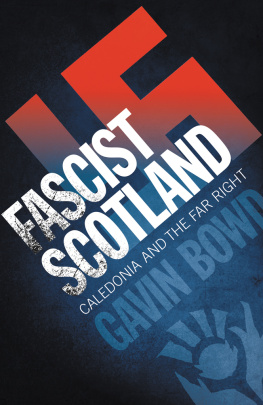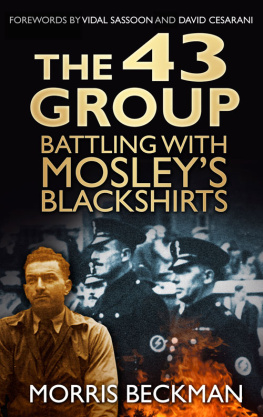CONTENTS
About the Author
Martin Pugh was Professor of Modern British History at Newcastle University until 1999, and Research Professor in History at Liverpool John Moores University from 1999 to 2002. He has written ten books on aspects of nineteenth- and twentieth-century history and is on the board of BBC History Magazine.
About the Book
Britain is celebrated for having avoided the extremism, political violence and instability that blighted many European countries between the two world wars. But her success was a closer thing than has been realized. Disillusionment with parliamentary democracy, outbreaks of fascist violence and fears of communist subversion in industry and the Empire ran through the entire period.
Fascist organizations may have failed to attract the support they achieved elsewhere but fascist ideas were adopted from top to bottom of society and by men and women in all parts of the country. This book will demonstrate for the first time the true spread and depth of fascist beliefs and the extent to which they were distinctly British. Like the Continental movements, fascism in the UK encompassed the corporate state, charismatic leadership and youthful rejection of the decadent rule of the older generation. But was it less anti-Semitic? Was it readier to adopt a feminist agenda? And was the fact that Britain finally repudiated fascism more a matter of timing and chance than of fundamental obstacles in British society and politics?
Hurrah for the Blackshirts!, rich in anecdotes and extraordinary characters, shows us an inter-war Britain on the high-road to fascism but never quite arriving at its destination.
Hurrah For The Blackshirts!
Fascists and Fascism in Britain Between the Wars
Martin Pugh

Think of what our Nation stands for,
Books from Boots and country lanes,
Free speech, free passes, class distinction,
Democracy and proper drains.
Sir John Betjeman, In Westminster Abbey, 1940
You have great contempt for democracy?
Yes.
Diana Mosley at the Advisory Committee on her detention, 2 October 1940
I went to a party at Chips Channons... There in his room were gathered the Nurembergers and the Munichois celebrating our victory over their friend Herr von Ribbentrop. I left in haste, leaving my coat behind me. A voice hailed me in Belgrave Square. It was Charles, seventh Marquis of Londonderry, Hitlers friend. As we walked towards his mansion in Park Lane, he explained to me how he had warned the Government about Hitler, how they would not listen to him; but for him, we should not have had the Spitfires.
Harold Nicolson on VE Day, in his Diaries and Letters
19391945 (1967), 4589
Pugh is one of the most well-respected, diligent and honest scholars working in British history today. This book deserves to be read.
Gerard DeGroot, Scotland on Sunday
This book demonstrates for the first time the true spread and depth of fascist beliefs and the extent to which they were distinctly British.
David Graham, Manchester Evening News
Hurrah for the Blackshirts! is scholarly history at its most stimulating and readable.
Paul Addison, Times Literary Supplement
This bracingly iconoclastic book takes leave of Orwellianism with immense style and offers in effect a radical re-interpretation of British political history from the Edwardian era right up to 1940.
Hywel Williams, The Oldie
A masterly study.
Neil Clark, Spectator
Splendid... [Pugh] meticulously charts the development of fascist ideology in Britain.
Richard Aldous, Irish Times
Admirable and provocative.
Paul Laity, Guardian
Illustrations
. Rotha Lintorn-Orman in 1923 (Getty Images).
. Alan Ian Percy, 8th Duke of Northumberland, pictured by the Saturday Review, 7 April 1934.
. Sir Patrick Hannon MP at an Anglo-German conference in 1926 (Hartley Library, University of Southampton).
. Arnold Leese, Director of the Imperial Fascist League (PRO).
. Gerrard V. Wallop, Viscount Lymington MP (9th Earl of Portsmouth), pictured by the Saturday Review, 24 March 1934.
. Food convoys in the East India Dock Road during the General Strike, 1926.
. Viscount Rothermere launches the Daily Mails campaign for the British Union of Fascists, 15 January 1934.
. Oswald Mosley and BUF members with Italian fascists in Rome, April 1933 (Birmingham University Special Collections).
. Oswald Mosley with William Joyce (Getty Images).
. Major-General J. F. C. Fuller (Getty Images).
. Lady Lucy Houston, millionaire owner of the Saturday Review and sponsor of the Flight over Everest, 1933.
. Maud, Lady Mosley, Sir Charles Petrie and Sir John Squire at a January Club dinner at the Savoy (Imperial War Museum).
. Oswald Mosley inspects women fascists in the Limehouse Branch, 4 July 1937 (British Union Collection, University of Sheffield Library).
. Oswald Mosley basking in the admiration of his supporters during a march from Kentish Town to Trafalgar Square, 4 July 1937 (British Union Collection, University of Sheffield Library).
. Oswald Mosley speaking from the top of a loudspeaker van in London, July 1938 (British Union Collection, University of Sheffield Library).
. Communists demonstrate against a BUF march, 4 July 1937 (British Union Collection, University of Sheffield Library).
. Lord Redesdale, Lady Redesdale, their daughter Unity Mitford and Dr Fitz-Randolph of the German Embassy, at an Anglo-German Fellowship concert, December 1938 (Getty Images).
. Sir Archibald Henry Maule Ramsay MP with his wife at Lords, July 1937 (Getty Images).
. Admiral Sir Barry Domvile with Arthur Bryant in 1933.
. Lord Mount Temple at an Anglo-German Fellowship dinner, July 1936 (Hartley Library, University of Southampton).
. BUF Womens Drum Corps at the Earls Court Peace Rally, 16 July 1939 (British Union Collection, University of Sheffield Library).
. The scene at the BUFs Peace Rally at Earls Court, 16 July 1939 (British Union Collection, University of Sheffield Library).
ONE
The Origins of British Fascism
Germany is organised not only for war but for peace. We are organised for nothing but party politics.
Winston Churchill to H. H. Asquith, 29 December 1908
ON 19 SEPTEMBER 1870 the troops of the Prussian army completed their encirclement of Paris, making almost inevitable the capitulation of the French capital four months later. But their unexpectedly swift victory did more than bring down the curtain on the empire of Napoleon III: it levered Europe into a new era of insecurity and struck at the foundations of British complacency. During the previous twenty years Britain, by sheer serendipity, had reached the peak of her industrial, commercial and imperial strength without being challenged by a major power. However, from the 1870s to the outbreak of the First World War in 1914 the conditions that had underpinned her success steadily unravelled. In the process confidence in her system of free trade and parliamentary government was undermined, and suspicious were voiced about the moral decline and racial degeneracy of the British people.
The late-Victorian and Edwardian period is usually examined in the light of
Next page












